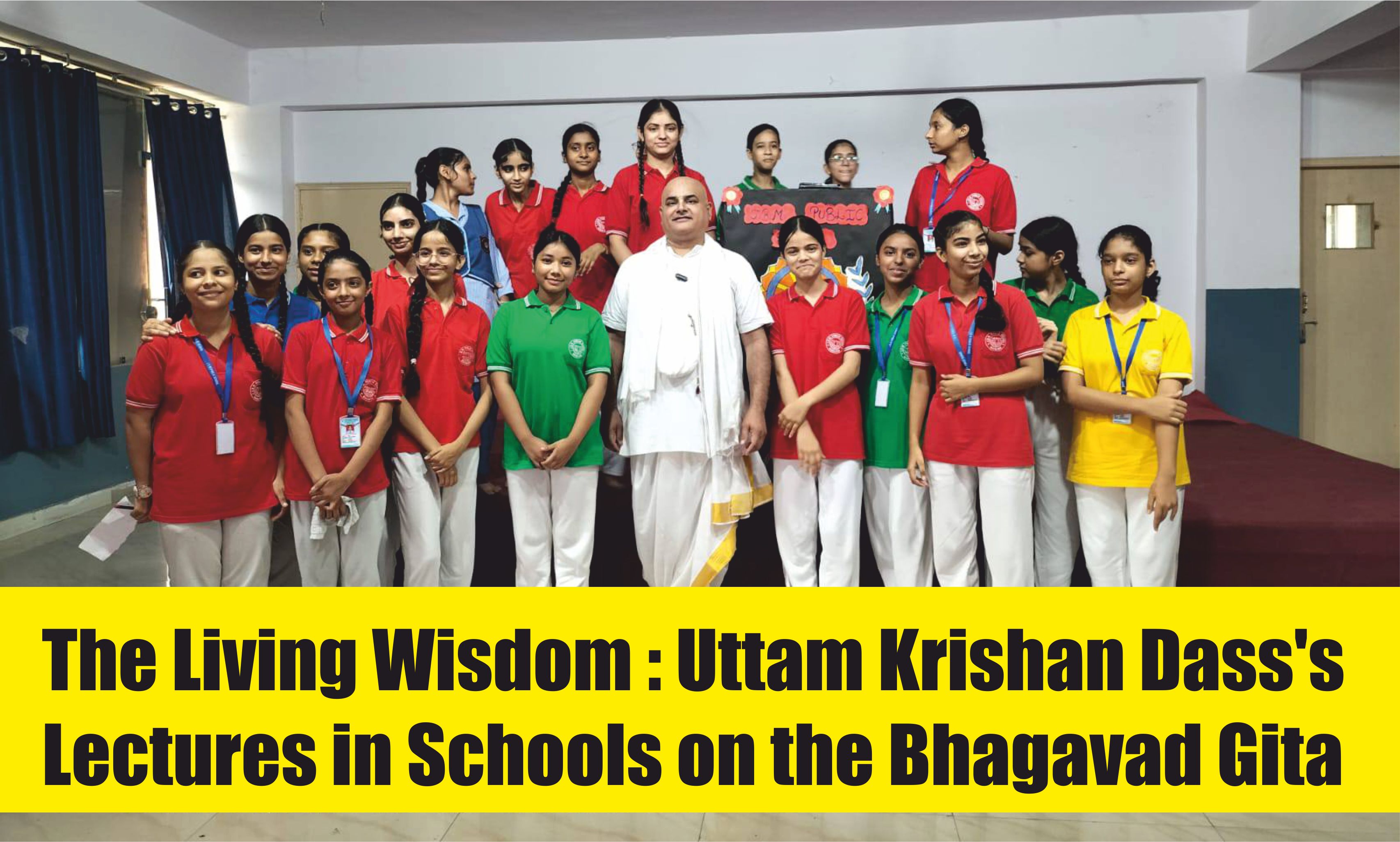The Living Wisdom: Uttam Krishan Dass’s Lectures on the Bhagavad Gita in Schools

In recent months, almost 1000 students from several schools in Delhi & NCR region, have had the privilege of attending lecture sessions by Uttam Krishna Das of Sri Raman Vihari Gaudiya Math, Janak Puri. These sessions focused on the Bhagavad Gita not only sought to provide philosophical insights but also showcase how this ancient text remains relevant, inspirational and practical for students dealing with the challenges of modern life.
Uttam Krishna Das is a speaker and teacher associated with Sri Raman Vihari Gaudiya Math, Janak Puri an is a group focused on spreading the divine knowledge of Goudiya Vaishnav Philosophy, religious harmony, moral development and character building, especially among the youth. Through his talks in schools, he brings to life the teachings of the Gita not as age-old texts, but as living wisdom – tools that students can use to develop discipline, inner strength, clarity and moral values.
Key Themes of the Lecture Sessions
1. Duty and Karma (Karma Yoga) Das highlights how the Bhagavad Gita teaches us that every person has duties: as a student, a child, a friend, a citizen. Abstention from duty does not lead to peace, but honesty, detachment from mere consequences, and carrying out responsibilities with consistency. This helps students to deal with pressure and expectations (from parents, school, peers) without any anxiety or confusion.
2. Self-control and internal discipline The Gita's teachings on controlling the mind, emotions, senses – managing one's impulses, thoughts and feelings - are presented as fundamental to good character, academic focus, emotional balance and mental well-being. Das links these to maintaining concentration, resisting distractions (e.g. social media, peer pressure), dealing with stress, and being resilient.
3. Clarity of purpose and values Students are encouraged to consider what they really want from their lives, what principles they want to live by. Gita helps by providing a framework: truth, non-violence, compassion, honesty, courage. Das emphasizes that concrete values help in making decisions: in friendships, studies, moral dilemmas, career choices.
4. Handling success and failure (equanimity) One of the most powerful messages of the Gita is to act without attachment to results and to maintain balance of mind in success or failure. The lectures show students that both winning and losing are momentary. What matters is effort, learning and growing through experiences. This reduces fear of failure, performance anxiety and frustration.
5. Stress, Anxiety and Mental Peace In a fast-paced, highly competitive academic environment, stress and anxiety are common. Das draws on the Gita's guidance on the importance of meditation, mindfulness, detachment from consequences, thought control, and self-awareness to help students cope, recover, and find inner peace.
6. Duty towards society, moral leadership Beyond personal gain, the lecture emphasizes that the Gita encourages service: to the family, to the community, to society. Students are urged to view themselves not as mere consumers or competitors but as responsible citizens. Leadership is not just about achieving success but doing so with integrity, compassion, fairness.
Impact on Students
From feedback and informal discussions after the lectures, several impacts are emerging:
- Greater Self Confidence
- Better Time Management and Focus
- Improved Emotional Resilience
- Stronger Ethical Foundations
Challenges and Reflections
Uttam Krishna Das also acknowledges that introducing spiritual/philosophical teachings in schools faces challenges such as the perception of religion versus philosophy, relevance to the modern context and consistency in follow-up sessions.
Why the Bhagavad Gita is Particularly Valuable for Student Life
- It teaches action with awareness.
- It cultivates inner strength over external validation.
- It helps in developing ethical decision making.
- It fosters mental peace.
- It encourages a sense of duty to others and society.
Sri Raman Vihari Gaudiya Math's Uttam Krishna Das's lecture sessions are more than spiritual talks; They are interventions in character building, mental health, morality and student welfare. In a world of distractions, pressures and ambiguity, the Bhagavad Gita comes through these sessions not just as scripture, but as a guide: to live with purpose, integrity, balanced action and inner peace. For students, these are lessons that go beyond exams – they build capabilities for life.



